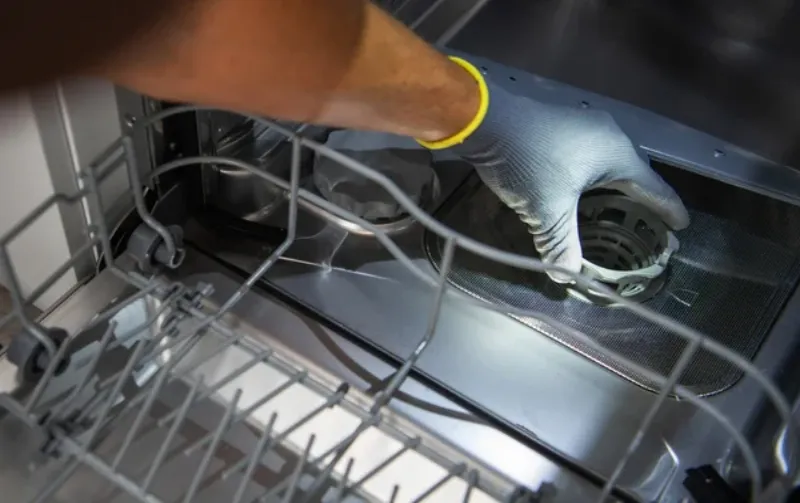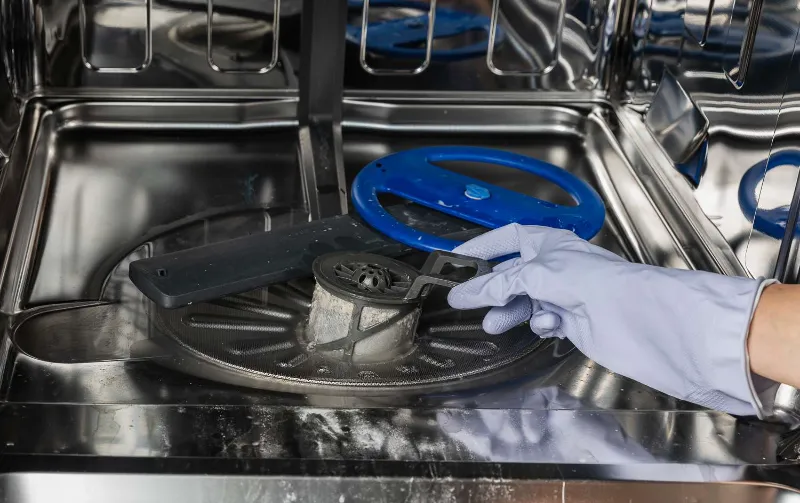No, you should not use drain cleaner in a dishwasher. These chemicals can damage the appliance and are unsafe for dishware.
Dealing with a clogged or foul-smelling dishwasher is a hassle that tempts quick fixes, but reaching for drain cleaner should not be on your list of solutions.
The harsh chemicals in drain cleaners can corrode the dishwasher’s internal parts, potentially leading to costly repairs or the need for a replacement.
A dishwasher is designed to handle food particles and grease, but it’s not equipped to cope with the aggressive agents found in drain cleaners.
Regular maintenance and proper usage are the best ways to keep your dishwasher running smoothly.
For safe alternatives to clean and maintain your appliance, consider using manufacturer-recommended products or natural solutions like vinegar and baking soda.
Remember, protecting your dishwasher from harsh substances will not only ensure its longevity but also keep your dishes and your home safe.

Understanding Drain Cleaners And Dishwashers
When it comes to maintaining our homes, ensuring that all appliances operate smoothly is a top priority.
Among these, dishwashers play a crucial role in our daily routine.
However, just like any other appliance, they can encounter issues, particularly with drainage.
You might wonder if you can repurpose a traditional drain cleaner for a dishwasher.
But before you do, it’s essential to grasp the intricacies of both drain cleaners and dishwashers.
Differentiating Types Of Drain Cleaners
Not all drain cleaners are created equal, and understanding their differences is crucial when considering their use.
These powerful solutions come in various forms:
- These are typically found in liquid, gel, or powder form and contain strong chemicals designed to dissolve clogs.
- Utilizing natural enzymes, these cleaners are eco-friendly alternatives that break down organic material within pipes.
- For physical intervention, tools such as plungers or plumber’s snakes can be effective without the need for chemicals.
Components And Working Of Dishwashers
The intricate design of a dishwasher accommodates a seamless wash cycle.
- Water is heated and mixed with detergent within the machine.
- Sprayers distribute the water and detergent mixture across the dishes.
- After cleaning, the dirty water drains out of the machine.
Essential components that facilitate these functions include filters, pumps, and hoses.
Due to their specific design, dishwashers require careful maintenance to preserve their functionality.
Risks Of Using Drain Cleaners In Dishwashers
Employing drain cleaners inside a dishwasher brings with it several risks:
- Harsh chemicals can corrode dishwasher components, compromising their longevity and performance.
- Residual chemicals might not be completely rinsed away, posing risks if they come into contact with dishes and utensils.
- Using unapproved cleaners can void the manufacturer’s warranty, leaving you without support for any ensuing issues.
Therefore, exercise caution and opt for maintenance tips or products recommended by the manufacturer when addressing dishwasher drainage problems.
Safety Precautions When Using Drain Cleaners In A Dishwasher
Ensuring safety precautions are in place is crucial before attempting to use drain cleaner in a dishwasher.
Although not a typical use, in scenarios necessitating this extreme measure, awareness of potential hazards and careful execution of the process is paramount.
Let’s delve into the critical safeguards one should implement to protect themselves, and their appliance, during this procedure.
Alternatives To Drain Cleaners For Dishwasher Maintenance
When dealing with a clogged or smelly dishwasher, it’s tempting to reach for a powerful drain cleaner. But hold on—what if there’s a better way?
Drain cleaners can be harsh and potentially damaging to the delicate components of your dishwasher.
Fortunately, there are several safe and effective alternatives to maintain your dishwasher’s performance and extend its lifespan.
Let’s explore some of these solutions under the following categories.
Natural Remedies And Diy Options
Why not start with gentle, eco-friendly options?
These natural solutions can keep your dishwasher running smoothly without the harshness of chemicals:
- A combination of baking soda and vinegar can work wonders for cleaning and deodorizing your dishwasher. Sprinkle a cup of baking soda across the bottom of the dishwasher and let it sit overnight. In the morning, add a cup of white vinegar to a dishwasher-safe bowl and run a hot-water cycle. This can help clear minor clogs and neutralize odors.
- Lemon juice is a natural acid that can dissolve soap scum and hard water deposits. Add a cup of lemon juice to the bottom of the dishwasher and run a normal cycle to cut through grime.
- For tougher clogs, pour a mixture of 1/2 cup of salt, 1/2 cup of baking soda, and 1/2 cup of vinegar into the dishwasher drain. Allow it to sit for about ten minutes, then follow up with a hot water cycle for an extra kick.
Professional Solutions And Services
When home remedies don’t cut it, it might be time to call in the professionals:
- A trusted appliance repair professional can diagnose and clear out blockages without causing damage to your dishwasher. They have specialized tools and expertise to handle deeper issues.
- High-quality commercial dishwasher cleaners are formulated to safely dissolve grease and build-up. Choose a product designed specifically for dishwashers and follow the manufacturer’s instructions for use.
Preventive Measures For Regular Maintenance
Prevention is the key to avoiding the need for drain cleaners altogether.
Regular maintenance ensures your dishwasher stays clean and clear.
- Before loading dishes, rinse them to remove large food particles that can clog the system.
- Once a month, run an empty cycle with a natural cleaner to keep the dishwasher interior fresh and to prevent build-up.
- Regularly check and clean the dishwasher filter to prevent debris from clogging the drain.
- Ensure dishes are loaded correctly to prevent utensils and other items from slipping into the bottom of the machine and obstructing the drain.
Handling And Disposal Of Drain Cleaner Residue From Dishwasher
Understanding how to manage the aftermath of using drain cleaner within a dishwasher is crucial for safety and the well-being of both the environment and your appliance.
Whether due to a misguided fix for clogged pipes or an incorrect cleaning method, drain cleaner residue requires careful attention.
Let’s delve into the best practices for cleaning dishwasher components affected by drain cleaners, the safe disposal of hazardous residues, and maintaining eco-friendly habits during this process.
Cleaning The Dishwasher Components
Immediate action is essential when dealing with drain cleaner residue within a dishwasher.
First, ensure that you’re wearing protective gear, such as gloves and goggles, to avoid any potential chemical burns or irritation.
- Begin by completely emptying the dishwasher of all dishes and dishwasher-friendly items.
- Thoroughly rinse the interior of the machine with water to dilute and wash away any remaining drain cleaner.
- If components can be removed safely, such as the racks and filter, do so and clean them separately using a solution of warm water and mild detergent.
- Run the dishwasher on a full cycle with hot water, without any dishes, to cleanse the system effectively.
Safely Disposing Of Drain Cleaner Residue
The disposal of drain cleaner liquid or solid residue requires careful attention, as these chemical compounds can be highly toxic and corrosive.
Adhere to the following steps for safe disposal:
- Check the drain cleaner’s label for specific disposal instructions provided by the manufacturer.
- Dilute any liquid residue with plenty of water before attempting to dispose of it.
- Solid residues should be contained in a sealable, heavy-duty plastic bag.
- Dispose of the residue according to your local hazardous waste disposal guidelines—never pour chemicals down the drain, toilet, or anywhere outdoors.
Eco-friendly Practices For Minimizing Environmental Impact
Maintaining an approach that considers the environmental footprint of handling chemicals is important.
The following eco-friendly practices can help minimize negative impacts:
- Use biodegradable or eco-friendly cleaners wherever possible to reduce chemical usage.
- Consider home remedies, such as baking soda and vinegar, for unclogging or maintaining clean dishes and dishwasher components.
- Participate in community hazardous waste collection programs for the disposal of chemical substances.
- Reduce the need for harsh chemicals by ensuring regular maintenance and cleaning of your dishwasher to prevent buildup that can lead to blockages.

Professional Advice And Maintenance Tips For Dishwashers
Keeping your dishwasher in top-notch condition is essential for both functionality and the longevity of the appliance.
However, questions often arise about the best practices for maintenance and repair.
Can you use drain cleaner in a dishwasher?
While it’s a common query, let’s delve into professional insights to ensure your dishwasher gets the care it deserves.
Hiring A Professional For Complex Issues
Sometimes, resolving dishwasher problems is not a straightforward DIY task.
Specific technical or complex issues should prompt you to seek professional help.
Expert technicians can diagnose and fix issues without causing further damage.
This includes problems such as drainage failures potentially instigated by using inappropriate cleaning agents like drain cleaner in your dishwasher, which is strongly discouraged.
- Dishwasher not draining
- Water leaks
- Electrical malfunctions
- Unusual noises during the operation
For each of these scenarios, professionals have the tools and expertise to restore proper function and provide advice for preventing future problems.
Routine Maintenance Practices
To prevent the need for urgent repairs and to keep your dishwasher running smoothly, adopting regular maintenance practices is key.
You can perform several easy checks and cleaning routines to avoid buildup and obstructions.
- Inspect and clean the spinning arms.
- Wipe down the edges and exterior to prevent grime.
- Check and clean the drain to avoid clogs.
- Run a vinegar cycle monthly to clear away any potential blockages and freshen up the interior.
These steps help maintain the efficiency of your dishwasher and prevent the temptation to use harsh drain cleaners, which can damage the appliance.
Long-term Care And Best Practices
A dishwasher, like any other appliance, thrives on proactive and consistent care.
You can extend its lifespan and enhance its performance through several long-term strategies:
| Best Practice | Description |
|---|---|
| Use recommended detergent | Opt for a brand and type that is specifically suited for dishwashers and keeps the machine in good health. |
| Avoid overloading | Ensure dishes are spaced out for optimal cleaning and to prevent strain on the system. |
| Soft water usage | Preventing excess mineral build-up from hard water can reduce the likelihood of internal damage. |
| Regular professional inspection | Having a specialist check your appliance annually can detect and mitigate issues early on. |
Stay clear of using drain cleaners or any other caustic chemicals inside your dishwasher.
The potential for irreversible damage not only affects the appliance but can also be hazardous to your health.
Stick to cleaners specifically formulated for dishwashers and follow the manufacturer’s instructions.
Frequently Asked Questions On Can You Use Drain Cleaner In A Dishwasher
Is Drain Cleaner Safe For Dishwashers?
Using drain cleaner in a dishwasher is not safe. It can damage the appliance’s internal components and lead to costly repairs.
What Dissolves Dishwasher Clogs Effectively?
For dishwasher clogs, use a mixture of baking soda and vinegar followed by hot water, which can often dissolve blockages without causing damage.
Can Vinegar Damage A Dishwasher’s Interior?
Vinegar is generally safe for cleaning dishwashers, as it’s a mild acid that can remove build-up without harming the interior.
Are All Chemical Cleaners Bad For Dishwashers?
Not all chemical cleaners are bad, but it’s crucial to use products specifically designed for dishwashers to prevent damage or residue.
Conclusion
To wrap things up, using drain cleaner in your dishwasher isn’t recommended. It can corrode parts and void warranties, leading to costly repairs.
For safe dishwasher maintenance, stick to products designed for it and consult your manual.
Remember, keeping your appliance in top shape preserves its lifespan and ensures cleaner dishes.
